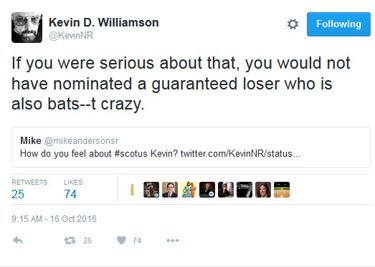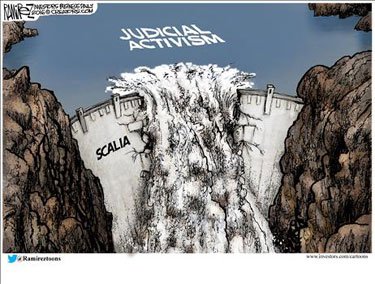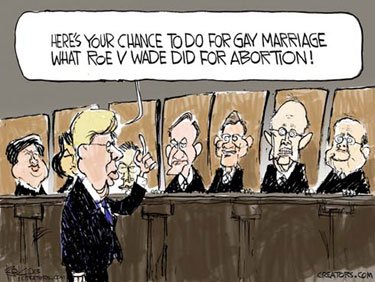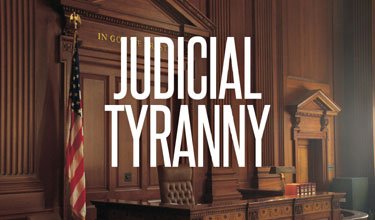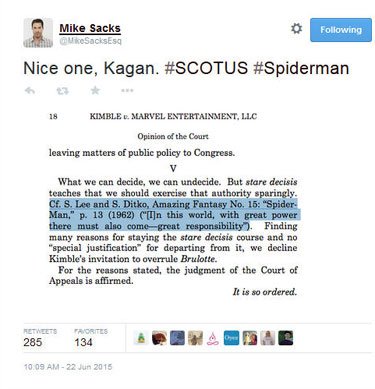Will SCOTUS Revive Freedom of Association?
Cakeshop v. Colorado Civil Rights Commission, Custodial State, Freedom of Association, Supreme Court
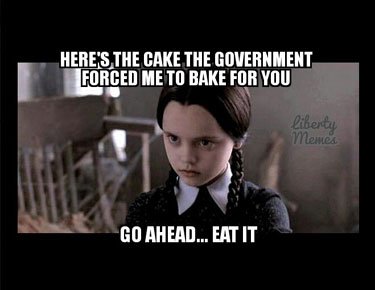
Zman thinks a major blow to the Custodial State may be in the works.
[T]he Left is in something close to a full panic over the oral arguments in Cakeshop v. Colorado Civil Rights Commission. The reason for this is the way Judge Gorsuch questioned the attorney for the homosexuals. He correctly pointed out that the “remedy†for the alleged discrimination, is to force the baker to say things in public that he would never say and that he finds offensive. Gorsuch did not say this, but this is how Chinese communists punished heretics in the Cultural Revolution.
Put another way, the “remedy†for those not wanting to associate, in this case do business with, another group of people, is to frog march them into the public square and force them to say things they think are false and possibly evil. Of course, it is the only remedy, short of genocide, that is possible in a society without freedom of association. Once the state can force you to be around other people, people you may not like, they have no choice but to supervise your speech, your thoughts and your every move. You are a slave.
That is the reality of the custodial state. The people in charge see themselves as your caretakers, like a baby sitter or care giver. In reality though, you are their slave, because like a slave, you no longer control your body. They control where it is and what it is permitted to do. In this particular case. the state is trying to force this baker to perform his services for the homosexuals. The efforts to punish him are no different from a slave master flogging a runaway slave. It’s to send a message to the rest of the slaves.
How To Save a Liberal Court? Kale, Gay Bodyguards, Maybe Vampirism…?
Ruth Bader Ginsburg, Supreme Court, The Left, Vampires

Ruth Bader Ginsburg nods off during event.
SFGate reports that lefties are panicking. Trump’s first Supreme Court appointment will be nearly impossible to oppose succcessfully, and Ruth Bader Ginsburg is 83 and a survivor of two forms of cancer. Gorsuch on the Court restores the 4 liberals, 4 conservatives, and Anthony Kennedy who can go either way status quo prevailing prior to the death of Antonin Scalia. One more conservative and Roe v. Wade might be in trouble.
On Tuesday evening, President Donald Trump nominated Neil Gorsuch for deceased Supreme Court Justice Antonin Scalia’s long-empty seat. On Wednesday morning, liberals woke up, did the math and realized it was time to be concerned about Ruth Bader Ginsburg’s fiber intake. Also bone density. Also exposure to airborne viruses (Madame Justice, what is your flu shot status?), and salmonella, and slippery ice, and also: Has anyone heard how scientists are coming along with a Zika vaccine?
“I’m very interested in this.” says Jeanette Bavwidinski, a community organizer in Pennsylvania. “I’m interested in what her daily regimen is. Like, what are you all feeding RBG? Is she getting enough fresh air? Is she walking? Is she staying low-stress? What is she reading? Is she reading low-stress things?”
“Can she eat more kale?” asks Kim Landsbergen, a forest ecologist in Ohio. “Eat more kale, that’s all I can say. We love you. Eat more kale.
The facts in play: Ginsburg is 83 years old, the oldest justice by more than three years. She is one of the four reliably liberal jurists on the Supreme Court, and a mascot and hero to the left. There is one swing vote on the court, Anthony M. Kennedy, and there are three staunch conservatives. Adding Gorsuch would maintain the balance that existed when Scalia was alive: conservative replacing conservative.
But what if Ginsburg retires? What if Ginsburg gets sick and needs a leave of absence? What if Trump ends up replacing Ginsburg? In a week that has seen a relentless churn of White House news, liberal residents of the nation funneled their worst fears into a tiny, elderly woman.
“I kept thinking, you know, I could organize a bunch of gays,” says John Hagner, a consultant for Democratic campaigns who lives in Washington. “I could organize the gays, and we would just make a protective circle around her at all times. We could help her get up and down the stairs. We got this.”
With a rainbow phalanx protecting the justice against potential slips and falls, Hagner would then feel free to turn his attention away from external dangers, and toward microbial pathogens. “At that point,” he says, “what I’m mostly concerned about is the cancer. Is she getting her checkups? Do her doctors realize how important it is for her to get her checkups? Do they? The woman is 98 pounds.”
Ginsburg, appointed to the bench 23 years ago, has the endurance of a “Law & Order” franchise, but there are those YouTube clips of her nodding off during the State of the Union address, and she has already survived both colon and pancreatic cancer (a death sentence to many, though Ginsburg was back at work two weeks after surgery). And there are those people who remain furious that she didn’t step down during Barack Obama’s presidency: “Looking back, it was seriously dumb (and, frankly, selfish) of Ruth Bader Ginsburg and Stephen Breyer not to retire from #SCOTUS in 2013,” fumed a user on Twitter shortly after the Gorsuch announcement.
But! Bygones. Now was the time for liberals to work with the reality they had. Now was the time to channel the energy of thousands of anxious supporters into a solution for the Ruth Bader Ginsburg problem.
“I was just talking to a friend about this,” says Michael J. McClure, an associate professor of art history at the University of Wisconsin. “Like, what could we do? What could we do to help Ruth Bader Ginsburg? Could we protect her with packing peanuts? Then it turned into, ‘I need to become a vampire. Like in ‘Twilight.’ I need to become a vampire so I can make her a vampire with eternal life.’ If I’m damned to eternal life myself, so be it. It’s a sacrifice worth making.”
Read the whole thing.
Trumpkins: “You’ve Got to Vote for Trump. The Supreme Court…”
Donald Trump, Kevin D. Williamson, Supreme Court, Twitter
Should SCOTUS Appointments Make Us Vote For Trump?
2016 Election, Donald Trump, Supreme Court
Jonathan V. Last, of the Weekly Standard, wonders why would anyone trust Donald Trump’s Supreme Court promises:
Pretty much the only reason conservatives have for supporting Donald Trump is the Supreme Court. “Think of SCOTUS!” is a superficially compelling argument. But only superficially.
For starters, conservatives have no reason–none–to believe that Trump would appoint a conservative justice. I point you here to Ramesh Ponnuru’s depressingly compelling assessment of Trump’s views of the high court:
Trump’s word is meaningless. He stiffs creditors and contractors. He lies about matters small and large: about having told Republicans to hold their convention in Ohio, about letters he supposedly received from the NFL and about having opposed the Iraq war from the start. Trump isn’t even trustworthy on his signature issue of immigration: He flip-flopped twice in one day during the campaign about whether high-skilled immigrants should be kept out as a threat to American jobs or welcomed as a boon to our economy.
Why would he keep his word on the courts? He doesn’t care about the Constitution or the proper role of judges. When he talks about the Constitution, it’s glibly and dismissively. When it’s suggested that the Constitution might pose an obstacle to his plans, he says it “doesn’t give us the right to commit suicide.” He knows almost nothing about the law: He can’t tell the difference between a judicial opinion and a bill.
The few times he has taken an interest in constitutional issues, he has been on the other side from most conservatives. He thinks the government should have broad power to take people’s property and give it to developers; they don’t. He has used courts as a weapon to silence critics, and thinks it should be easier to use them that way. Most conservatives find that record and that idea appalling. If President Trump asks his aides to find him a judge who agrees with him on these issues, they will start by scrapping his list.
The next part of “Remember the SCOTUS!” insists that Republican senators–the same group of sell-out, RINO elites that are always being blamed for Trump’s rise–will somehow discover the backbone to force Trump into picking a conservative. What in the history of Trump’s relationship with institutional Republicans might lead one to believe that they, the GOP, could bend Trump to their will? Search me.
Last week David Frum wondered if the dynamic might not run the other way, actually: “Isn’t it more likely that President Trump will choose his judicial nominees to spite Paul Ryan and Mitch McConnell than to please them?”
After watching Trump attack Paul Ryan, Kelly Ayotte, and John McCain last week, the answer to this question has got to be–at least–maybe?
And here’s Ponnuru again, gaming out a much more plausible scenario for what Trump might do:
To get a conservative on the Supreme Court would require a President Trump to wage an ideological war with Senate Democrats, even though he says he would prefer to be a dealmaker, and even though that war would turn on issues for which he has never in his life shown the slightest concern. Instead of making good on his promise, he could cut a deal with the Democrats. His nominee could then win confirmation with the support of most Democrats, moderate Republicans, and some conservative Republicans who will want to be on the same side as Trump.
Read the whole thing.
Without Scalia
Justice Antonin Scalia, Michael Ramirez, Supreme Court, The Law, US Constitution
Constitutional Jurisprudence in 2015
Obergefel v. Hodges, Supreme Court, The Law, US Constitution
Christopher Taylor identifies the point we’ve reached in America’s relationship to its Constitution.
And so we reach the point at which I’ve given up the idea of ever getting back to the constitution today. In fact, I’ve come to the realization that there’s no point in appealing to the document as any kind of governing and restraining document because the government and people have simply abandoned it except as a fetish.
Recent supreme court decisions have simply negated the constitution entirely, building on decades of ignoring and twisting the document, inventing things not in it until its simply trash. And all of this happened because of well-meaning tiny little steps, any one of which the founding fathers would have been enraged at, but we sigh and shrug at today.
There is no rational basis for thinking that any government will reverse this. It simply is without precedent in human nature and history for a politician to voluntarily surrender their own power or a government to weaken its self. There is only one direction, one trend: toward tyranny.
The founders knew this. They did their best to lock in our freedom and protect this inevitable tendency of the state. It was so well done that the nation lasted more than a century with great, widespread liberties. That era is over, and only one future lies before us, barring some act of God.
The only question is what lies beyond that point, and how we get through it.
Let’s Start Electing the Supreme Court
Andrew C. McCarthy, Supreme Court
Andrew C. McCarthy thinks it’s time to drop the fiction that Supreme Court justices are following the law. Last week’s decisions demonstrate once and for all that the majority of the Court is comprised of partisan politicians.
Already, an ocean of ink has been spilled analyzing, lauding, and bemoaning the Supreme Court’s work this week: a second life line tossed to SCOTUScare in just three years; the location of a heretofore unknown constitutional right to same-sex marriage almost a century-and-a-half after the adoption of the Fourteenth Amendment; and the refashioning of Congress’s Fair Housing Act to embrace legal academe’s loopy “disparate impact†theory of inducing discrimination.
Yet, for all the non-stop commentary, one detail goes nearly unmentioned — the omission that best explains this week’s Fundamental Transformation trifecta.
Did you notice that there was not an iota of speculation about how the four Progressive justices would vote?
There was never a shadow of a doubt. In the plethora of opinions generated by these three cases, there is not a single one authored by Ruth Bader Ginsburg, Stephen Breyer, Elena Kagan, or Sonia Sotomayor. There was no need. They are the Left’s voting bloc. There was a better chance that the sun would not rise this morning than that any of them would wander off the reservation.
There was not an iota of speculation about how the four Progressive justices would vote.
How can that be? Jurisprudence is complex. Supple minds, however likeminded, will often diverge, sometimes dramatically, on principles of constitutional adjudication, canons of statutory construction, murky separation-of-powers boundaries, the etymology of language, and much else. Witness, for example, the spirited debate between the Court’s two originalists, Scalia and Clarence Thomas, over a statute that, in defiance of Obama policy, treats Jerusalem as sovereign Israeli territory.
But not the Court’s lefties, not on the major cases.
And it is not so much that they move in lockstep. It is that no one expects them to do anything but move in lockstep — not their fellow justices, not the political branches, and certainly not the commentariat, right or left.
It is simply accepted that these justices are not there to judge. They are there to vote. They get to the desired outcome the same way disparate-impact voodoo always manages to get to discrimination: Start at the end and work backwards. Guiding precedents are for the quaint business of administering justice. In the social justice business, the road never before traveled will do if one less traveled is unavailable.
But there’s a problem. Once it has become a given that a critical mass of the Supreme Court is no longer expected, much less obliged, to do law, then the Court is no longer a legal institution. It is a political institution.
That is where we are. We should thus drop the pretense that the Court is a tribunal worthy of the protections our system designed for a non-political entity — life-tenure, insulation from elections, and the veil of secrecy that shrouds judicial deliberations.
If the justices are going to do politics, they should be in electoral politics. If John Roberts is going to write laws on the days when he isn’t posing as powerless to write laws, if Anthony Kennedy truly believes the country craves his eccentric notion of liberty (one that condemns government restraints on marriage 24 hours after it tightens government’s noose around one-sixth of the U.S. economy), then their seats should not be in an insulated third branch of government. They should be in an accountable third chamber of Congress.
If, for old times’ sake, we want to maintain some harmless vestige of the charade, then let them keep wearing their robes to work — for at least as long as they can persuade voters to keep them in these jobs. Let’s dispense, though, with the fiction that their judgments are the product of legal acumen rather than sheer will.
Read the whole thing.
Scalia Nails It
Gay Marriage, Judicial Tyranny, Supreme Court
From Justice Scalia’s dissent:
The substance of today’s decree is not of immense personal importance to me. The law can recognize as marriage whatever sexual attachments and living arrangements it wishes, and can accord them favorable civil consequences, from tax treatment to rights of inheritance. Those civil consequences—and the public approval that conferring the name of marriage evidences—can perhaps have adverse social effects, but no more adverse than the effects of many other controversial laws. So it is not of special importance to me what the law says about marriage. It is of overwhelming importance, however, who it is that rules me. Today’s decree says that my Ruler, and the Ruler of 320 million Americans coast-to-coast, is a majority of the nine lawyers on the Supreme Court. The opinion in these cases is the furthest extension in fact—and the furthest extension one can even imagine—of the Court’s claimed power to create “liberties†that the Constitution and its Amendments neglect to mention. This practice of constitutional revision by an unelected committee of nine, always accompanied (as it is today) by extravagant praise of liberty, robs the People of the most important liberty they asserted in the Declaration of Independence and won in the Revolution of 1776: the freedom to govern themselves.
You Could Tell This Was Coming
Egalitarianism, Gay Marriage, Supreme Court
Breaking News via SCOTUSBLOG: There is a right to “marriage equality”. Opinion: J. Kennedy.
Scalia’s dissent, footnote 22: “If, even as the price to be paid for a fifth vote, I ever joined an opinion for the Court that began: ‘The Constitution promises liberty to all within its reach, a liberty that includes certain specific rights that allow persons, within a lawful realm, to define and express their identity,’ I would hide my head in a bag. The Supreme Court of the United States has descended from the disciplined legal reasoning of John Marshall and Joseph Story to the mystical aphorisms of the fortune cookie.”
Liberal Reaction to Hobby Lobby Ruling
Burwell v. Hobby Lobby Stores Inc., Community of Fashion, Freedom of Religion, Religion, Supreme Court, The Elect, Thomas Babbington Macauley, Thomas More
My pseudointellectual liberal classmates have been reacting to the Supreme Court decision in favor of Hobby Lobby, excusing religious employers from providing contraception through employee health insurance, with ridicule, treating the very idea of moral reservations toward contraception as bizarre, insane, and a fringe position.
But the civilization of Europe and the Modern World were actually built by people of traditional religious faith, who until very recently in overwhelming percentage believed on the basis of revealed religion that contraception was wrong. I am not myself a believer, but I differ from most of my Yale classmates in declining to believe that today’s community of fashion has arrived at some uniquely superior and sophisticated position on every issue and that anyone who disagrees is some sort of troglogyte.
Thomas Babbington Macauley was the ultimate Whig historian, but even Macauley found himself obliged to acknowledge that Modernism and Scientism are not actually competent to refute religious faith.
Natural theology, then, is not a progressive science. That knowledge of our origin and of our destiny which we derive from revelation is indeed of very different clearness, and of very different importance. But neither is revealed religion of the nature of a progressive science. All divine truth is, according to the doctrine of the Protestant churches, recorded in certain books. It is equally open to all who, in any age, can read those books; nor can all the discoveries of all the philosophers in the world add a single verse to any of those books. It is plain, therefore, that in divinity there cannot be a progress analogous to that which is constantly taking place in pharmacy, geology, and navigation. A Christian of the fifth century with a Bible is neither better nor worse situated than a Christian of the nineteenth century with a Bible, candor and natural acuteness being, of course, supposed equal. It matters not at all that the compass, printing, gunpowder, steam, gas, vaccination, and a thousand other discoveries and inventions, which were unknown in the fifth century, are familiar to the nineteenth. None of these discoveries and inventions has the smallest bearing on the question whether man is justified by faith alone, or whether the invocation of saints is an orthodox practice. It seems to us, therefore, that we have no security for the future against the prevalence of any theological error that ever has prevailed in time past among Christian men. We are confident that the world will never go back to the solar system of Ptolemy; nor is our confidence in the least shaken by the circumstance that even so great a man as Bacon rejected the theory of Galileo with scorn; for Bacon had not all the means of arriving at a sound conclusion which are within our reach, and which secure people who would not have been worthy to mend his pens from falling into his mistakes. But when we reflect that Sir Thomas More was ready to die for the doctrine of transubstantiation, we cannot but feel some doubt whether the doctrine of transubstantiation may not triumph over all opposition. More was a man of eminent talents. He had all the information on the subject that we have, or that, while the world lasts, any human being will have. The text, “This is my body,†was in his New Testament as it is in ours. The absurdity of the literal interpretation was as great and as obvious in the sixteenth century as it is now. No progress that science has made, or will make, can add to what seems to us the overwhelming force of the argument against the real presence. We are, therefore, unable to understand why what Sir Thomas More believed respecting transubstantiation may not be believed to the end of time by men equal in abilities and honesty to Sir Thomas More. But Sir Thomas More is one of the choice specimens of human wisdom and virtue; and the doctrine of transubstantiation is a kind of proof charge. A faith which stands that test will stand any test.
